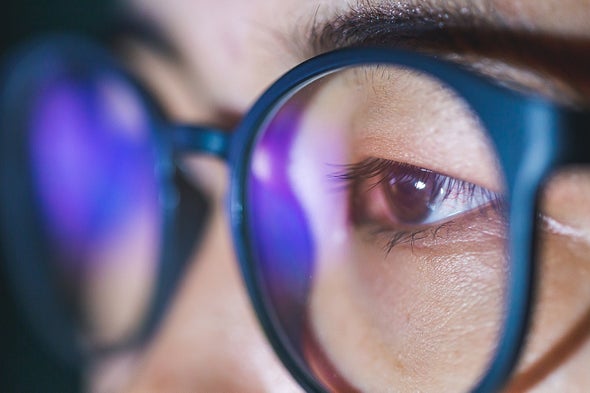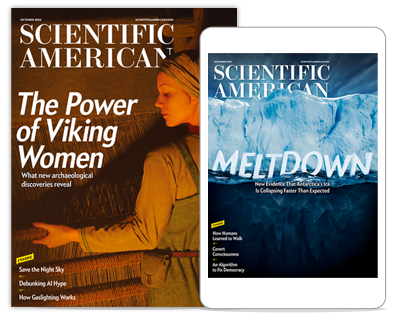Blue-light-filtering glasses have become an increasingly popular solution for shielding our eyes from electronic screens’ near-inescapable glow—light that is commonly associated with eyestrain and poor sleep. In recent years they’ve even become fashion statements that are endorsed by celebrities and ranked in style guides. But a recent review paper shows such lenses might not be as effective as people think.
The paper, published last week in the Cochrane Database of Systematic Reviews, analyzed data from previous trials that studied how blue-light-filtering lenses affect vision fatigue, sleep quality and eye health. The study’s authors found that wearing blue-light filters does not reduce the eyestrain people feel after using computers. The results were inconclusive on whether wearing these specialized lenses before bedtime improves sleep quality.
“It’s an excellent review,” says Mark Rosenfield, a professor at the State University of New York College of Optometry, who was not involved in the study. “The conclusions are no surprise at all.... There have been a number of studies that have found exactly the same thing, that there’s just no evidence that blue-blocking lenses have any effect on eyestrain.” He adds that the new review reinforces the fact that there is virtually no evidence that blue-blocking lenses affect eyestrain despite them being specifically marketed for that purpose.
Studies have shown high prescription rates for blue-light-filtering eyewear in several countries, including India, the U.K. and Australia. In 2019 researchers at the University of Melbourne surveyed optometrists in Australia and found that about 75 percent of them prescribed blue-light-blocking glasses in their clinical practice. Laura Downie, an associate professor of optometry and vision sciences at the University of Melbourne and co-author of the 2019 survey, decided to further investigate the quality of existing evidence on the eyewear’s ability to improve eyestrain, poor sleep or impaired vision from using digital devices.
Eye Health and Vision Fatigue
For their new review, Downie and her colleagues identified 17 randomized controlled trials from six countries. Studies had from five to 156 participants and ran from less than a day to five weeks. The analysis of the trials showed that there is no short-term advantage to using blue-light-filtering spectacles for reducing vision fatigue, compared with standard clear lenses. Only one of the studies examined the impact of blue-light-filtering glasses on eyesight, and it suggested that there was little to no effect. The researchers also couldn’t draw conclusions about the lenses’ impact on other eye health conditions, such as retinal damage, because none of the included trials studied such outcomes.
Despite popular belief that blue light causes or worsens eyestrain, Rosenfield thinks the connection is weak. The biggest source of blue light is the sun; digital devices’ screens emit less than 1 percent of the amount of blue light that people get from solar rays. Plus, there’s no known physiological mechanism that links blue light to eye fatigue, he says.
The strain we may feel while staring at our phone or computer screen too long is likely caused by multiple factors, such as bad habits or underlying conditions, Downie says. She and Rosenfield both argue that how we interact with digital devices contributes more to eyestrain than screens’ blue light does. Changing the frequency and duration of screen usage and distancing one’s eyes from the screens might be more important in reducing discomfort, Downie says. She adds that people who experience eyestrain should see a doctor to assess whether they have an underlying health issue such as farsightedness or dry eye disease.
Sleep Issues
Poor sleep has also been heavily tied to exposure to blue light from screens. Previous studies have indicated that late-night device usage disrupts sleep patterns, Rosenfield says. Blue light is known to interfere with the release of melatonin, the hormone that sends a sleep signal to the brain. This has led researchers to link sleep cycle disruptions to blue light.
But Downie and her team’s analysis revealed that filtering out blue light before bed might not really help. Although six of the trials studied whether wearing blue-light-filtering lenses before bedtime affected sleep quality, the findings from the trials were inconsistent. Three of the studies reported a significant improvement in sleep quality with blue-light-filtering lenses, while the other three reported no significant difference between the filter-wearing group and the control group. The participants were also mostly people with sleep disorders. Downie and her colleagues couldn’t draw any conclusions about whether blue-light-filtering lenses are useful for the general adult population.
Another option for improving sleep could be to activate the “night shift” or “dark mode” available on many smartphones, Rosenfield says. These modes prompt the screens to emit warmer colors, reduce glare and lower blue-light emissions. Whether this setting helps with one’s sleep more than the specialized glasses do is relatively unknown, however.
Rosenfield says more studies are needed on blue light—and on filters, more broadly—to understand the impact on eye care. For instance, more information is needed on whether certain wavelengths of blue light are more harmful than others, Rosenfield says. Researchers also might consider testing blue-light-filtering glasses that block out more of it.
As for using blue-light-filtering eyeglasses for eye health, for now, Rosenfield says, “there’s nothing to support people buying them.”

